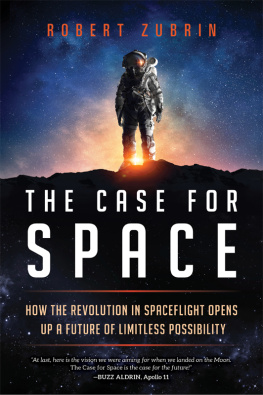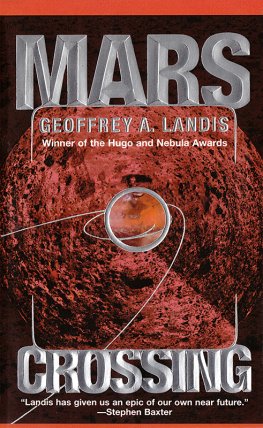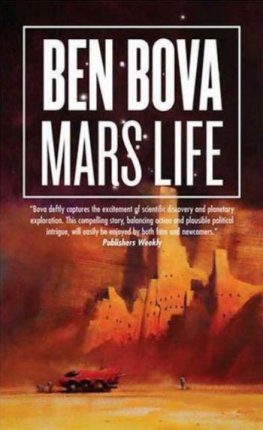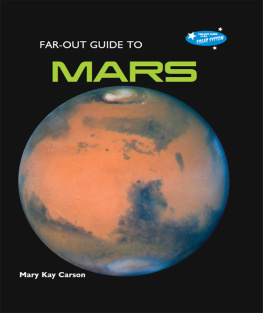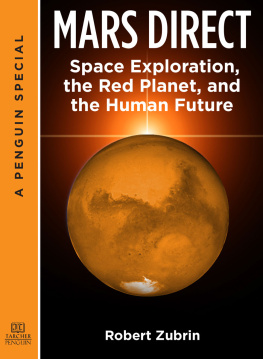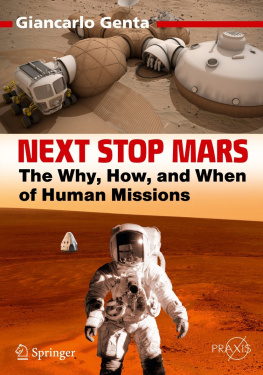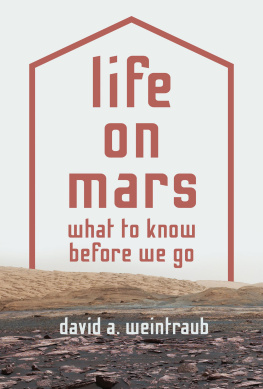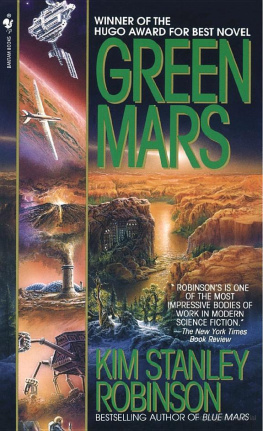

To Maggie, Eliot, Sarah, and Rachel:
my family, friends, and hope for the future.

TOUCHSTONE
Rockefeller Center
1230 Avenue of the Americas
New York, NY 10020
www.SimonandSchuster.com
Copyright 1996 by Robert Zubrin
All rights reserved, including the right of reproduction in whole or in part in any form.
First Touchstone Edition 1997
TOUCHSTONE and colophon are trademarks of Simon & Schuster Inc.
Designed by Carla Bolte
Manufactured in the United States of America
10 9
Library of Congress Cataloging-in-Publication Data
Zubrin, Robert.
The case for Mars: the plan to settle the red planet and why we must / Robert M.
Zubrin with Richard Wagner..
p. cm.
Includes bibliographical references.
ISBN 0-684-82757-3
1. Mars (Planet) 2. Life on other planets. I. Wagner, Richard (Richard S.), 1953
II. Title.
QB641. Z83 1996
919.9'2304dc20
9626560
CIP
ISBN 0-684-83550-9 (Pbk)
eISBN 978-1-4391-3521-1
Henceforth I spread confident wings to space
I fear no barrier of crystal or of glass;
I cleave the heavens and soar to the infinite.
And while I rise from my own globe to others
And penetrate even further through the eternal field,
That which others saw from afar, I leave far behind me.
Giordano Bruno
On the Infinite Universe and Worlds, 1584
CONTENTS
FOREWORD
The planet Mars is where the action will be in the next century. It is the only world in the solar system on which there is a strong probability of finding Life Past, and perhaps even Life Present. Also, we can reach itand survive on itwith technologies which are available today, or which we can acquire in the very near future.
Robert Zubrins bookwhich is often very amusing and contains asides which will not endear him to NASAis the most comprehensive account of the past and future of Mars that I have ever encountered. It explains why we should go there, how we may go thereand, perhaps most important of all, how we may live on the land when we get there.
Personally, I am delighted to think thatif Dr. Zubrins persuasive arguments are acceptedthe first expedition to Mars may leave shortly before my ninetieth birthday. Meanwhile, if all goes well, the Russian Mars Lander will be leaving just before my seventy-eighth, carrying a message I have videod for the colonists of the next century:
MESSAGE TO MARS
My name is Arthur Clarke, and I am speaking to you from the island of Sri Lanka, once known as Ceylon, in the Indian Ocean, Planet Earth. It is early spring in the year 1993, but this message is intended for the future. I am addressing men and womenperhaps some of you already bornwho will listen to these words when they are living on Mars.
As we approach the new millennium, there is great interest in the et which may be the first real home for mankind beyond the mother world. During my lifetime, I have been lucky enough to see our knowledge of Mars advance from almost complete ignoranceworse than that, misleading fantasyto a real understanding of its geography and climate. Certainly we are still very ignorant in many areas, and lack knowledge which you take for granted. But now we have accurate maps of your wonderful world, and can imagine how it might be modifiedterraformedto make it nearer to the hearts desire. Perhaps you are already engaged upon that centuries-long process.
There is a link between Mars and my present home, which I used in what will probably be my last novel, The Hammer of God. At the beginning of this century, an amateur astronomer named Percy Molesworth was living here in Ceylon. He spent much time observing Mars, and now there is a huge crater, 175 kilometers wide, named after him in your southern hemisphere. In my book Ive imagined how a New Martian astronomer might one day look back at his ancestral world, to try and see the little island from which Molesworthand Ioften gazed up at your planet.
There was a time, soon after the first landing on the Moon in 1969, when we were optimistic enough to imagine that we might have reached Mars by the 1990s. In another of my stories, I described a survivor of the first ill-fated expedition, watching the Earth in transit across the face of the Sun on May 111984! Well, there was no one on Mars then to watch that eventbut it will happen again on November 10, 2084. By that time I hope that many eyes will be looking back towards the Earth as it slowly crosses the solar disk, looking like a tiny, perfectly circular sunspot. And Ive suggested that we should signal to you then with powerful lasers, so that you will see a star beaming a message to you from the very face of the sun.
I too salute to you across the gulfs of spaceas I send my greetings and good wishes from the closing decade of the century in which mankind first became a space-faring species, and set forth on a journey that can never end, so long as the universe endures.

Doubtless in many of its details, Dr. Zubrins booklike my own exercise in terraforming Mars, The Snows of Olympuswill be bypassed by future advances in technology. However, it demonstrates beyond all reasonable doubt that the first self-sustaining human colony beyond Mother Earth lies within the grasp of our children.
Will they seize the opportunity? It is almost fifty years since I ended my first book, Interplanetary Flight, with these words:
The choice, as Wells once said, is the Universeor nothing.... The challenge of the great spaces between the worlds is a stupendous one; but if we fail to meet it, the story of our race will be drawing to its close. Humanity will have turned its back upon the still untrodden heights and will be descending again the long slope that stretches, across a thousand million years of time, down to the shores of the primeval sea.
Arthur C. Clarke
1 March 1996
PREFACE
We choose to go to the Moon! We choose to go to the Moon in this decade and do the other things, not because they are easy but because they are hard, because that goal will serve to organize and measure he best of our energies and skills, because that challenge is one that we are willing to accept, one we are unwilling to postpone, and one which we intend to win.... This is in some measures an act of faith and vision, for we do not know what benefits await us.... But space is there and we are going to climb it.
John F. Kennedy, 1962
The time has come for America to set itself a bold new goal in space. The recent celebrations of the twenty-fifth anniversary of the Apollo Moon landings have reminded us of what we as nation once accomplished, and by so doing have put the question to us: Are we still a nation of pioneers? Do we choose to make the efforts required to continue as the vanguard of human progress, a people of the future, or will we allow ourselves to be a people of the past, one whose accomplishments are celebrated only in museums? When the fiftieth anniversary arrives, will our posterity honor it as the touchstone of a frontier pushing tradition that they continue? Or will they look upon it much as a seventh century Roman may have once gazed upon the aqueducts and other magnificent feats of classical architecture still visible among the ruins, saying to himself in amazement, We once built that?
Next page

